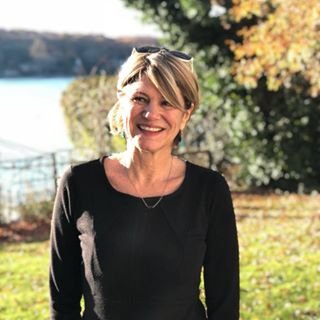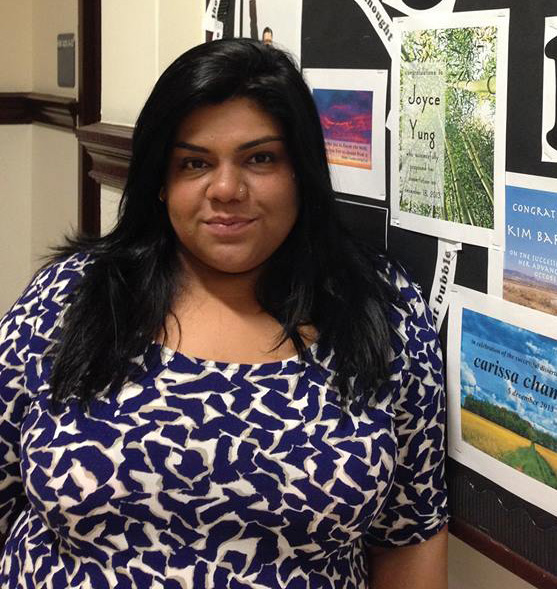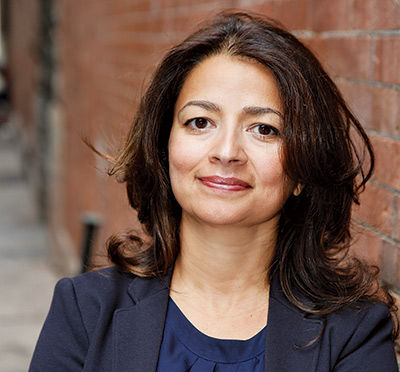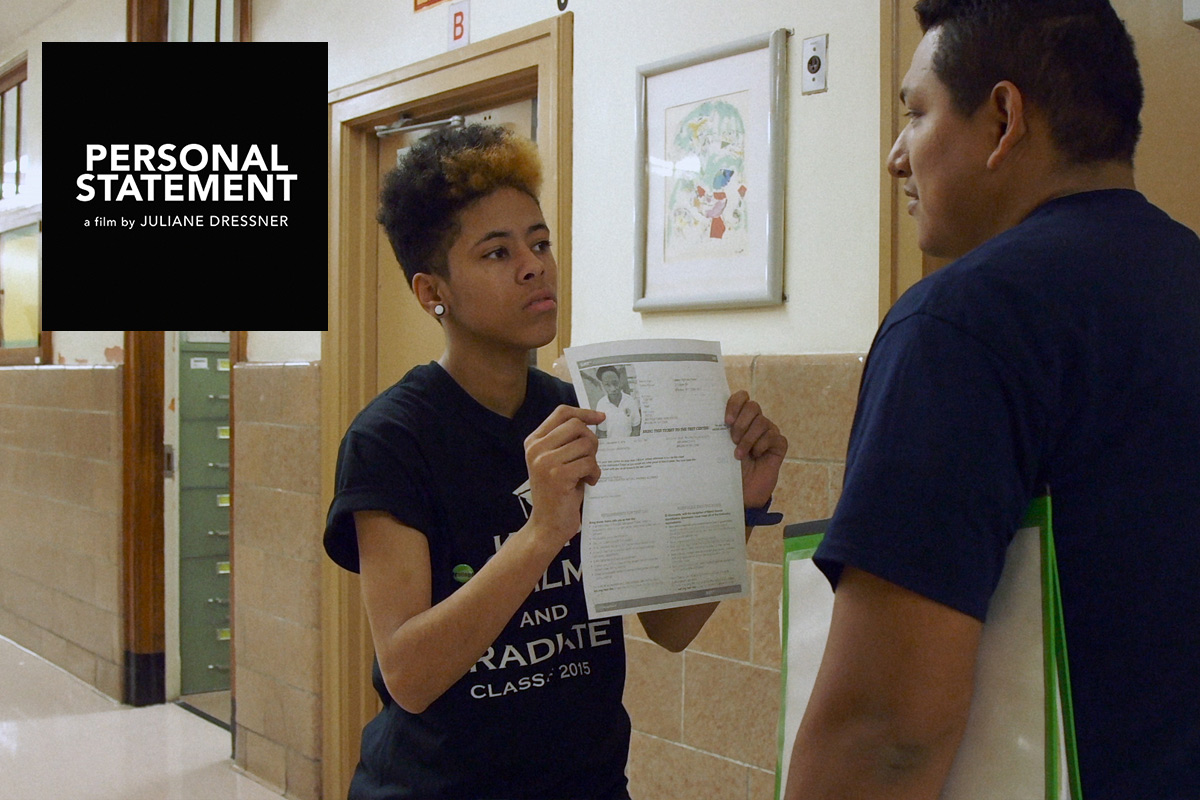Four years ago, even as he was sleeping on his sister’s couch because his mom was in a homeless shelter, Enoch Jemmott was serving as a college guidance counselor for hundreds of his high school classmates.
Amid recent headlines about the criminal schemes of wealthy parents trying to get their kids into elite colleges, the documentary Personal Statement is showing the flip side: the hurdles that low-income and minority youth like Enoch face in navigating the nation’s higher education system without even the most basic guidance and information. The film follows the efforts of Enoch and two other seniors at their New York City public schools to advise classmates even as they struggle with their own college applications.
[Click here to watch a recent feature on Personal Statement by CBS News.]
Personal Statement Film Trailer
Personal Statement will be screened at Teachers College, Columbia University, 525 West 120th Street, on Saturday, April 13th at 12:00 pm, as part of the College’s annual Academic Festival.
[Click here to register for Academic Festival and check out the full schedule of events.]
After the screening, Personal Statement director Juliane Dressner, Enoch and Christine Rodriguez, another student in the film, will speak along with faculty member Riddhi Sandil, who heads TC’s unique College Advising Initiative, and Liz Willen, Editor-in-Chief of the Hechinger Report, the nonprofit, independent news outlet based at Teachers College. [Read an opinion piece by Enoch Jemmott recently published in The New York Times. Read a Hechinger Report column about Personal Statement by Willen.]

Liz Willen, Editor In Chief, Hechinger Report
Academic Festival is Teachers College’s signature homecoming event – a day of panels by alumni, faculty and students. This year’s Festival, themed Creating Pathways for All to Flourish, will include:
- “Advocating for Your Seat at the Table,” a TED Talk-style presentation by alumna Sayu Bhojwani, founding director of New American Leaders, a nonprofit that trains first- and second-generation Americans to run for political office, and author of People Like Us: The New Wave of Candidates Knocking at Democracy’s Door.
- “Media Literacy in a Post-Truth Era,” a roundtable on the skills young people need to function as capable citizens in a digital world. The panelists include Michelle Ciulla-Lipkin, Executive Director of the National Association of Media Literacy Education, and TC professor Ioana Literat, who has extensively studied how youth reacted on creative web platforms to the election of Donald Trump.
- “The Power of Storytelling,” a discussion of the medium’s potential for instilling compassion, empathy, tolerance and respect. The panelists include TC alumni Fanshen Cox, creator of the one-woman show “One Drop of Love”; Denny Taylor, godmother of the family literacy movement; and Bruce Ballard, an official blogger for the World Parkinson Congress.
Taking its name from the 500-word essay that is among the keys to college admission, Personal Statement originally premiered on PBS and is coming to TC following a screening at the South by Southwest Festival in Austin, Texas, where it won rave reviews for its combination of moving human drama and unflinching realism. The subtext to the narrative is the nationwide shortage of guidance counselors – 1 for every 491 students.
[Learn more in the Hechinger Report series “Guidance Gap.”]
“I realized that students stepping up to fill the college guidance gap themselves was a perfect way to illustrate not only the barriers they face in achieving their dreams of going to college, but also to be inspired by their heroic efforts to surmount those barriers,” says Dressner, who made Personal Statement with Edwin Martinez.
Indeed, as the film portrays, the college admissions process is so daunting (“byzantine,” Dressner calls it) that Enoch, who had spent a summer learning the nuances of the system, remained unaware of factors that could have aided him in his own quest for financial aid.
I realized that students stepping up to fill the college guidance gap themselves was a perfect way to illustrate not only the barriers they face in achieving their dreams of going to college, but also to be inspired by their heroic efforts to surmount those barriers.”
—Juliane Dressner
“Enoch had trouble getting the financial documents he needed from his mother,” Dressner says. “He only realized later that he might have been able to get a waiver, and not had to submit many of the forms, because his mother was living in a homeless shelter. The process can be very complicated - and that’s why trained school counselors are needed, and why we need more of them so that they have more time to work with students.”
At the same time, the film makes a powerful case for harnessing the talent and dedication of students to help their peers. “One of the things we’d like to come out of the film is for people to understand the power of peer counseling and, more generally, recognize the power of young people to bring about change in their communities. They are, in fact, the most important voices we should be listening to when we think about education reform.“

Riddhi Sandil, Assistant Professor of Practice
But students should augment, not substitute for, qualified professionals. TC’s College Advising Initiative, which offers an online continuing education course and a graduate-level advanced certificate, aims to fill that gap. TC students can also become certified school counselors by earning a master's degree (Ed.M.) in school counseling, which will soon be offered online.
It becomes a hamster’s wheel: you’re already disenfranchised, you don’t get the resources to get out of being disenfranchised, and you stay in that cycle.”
—Riddhi Sandil
“So many students come from disenfranchised families – they don’t have parents who went to college and they don’t understand the systems of college,” says Sandil. “Their schools are under-resourced, so they haven’t received the right guidance or mentorship. And yet we know that going to college is one way to escape economic security. So it becomes a hamster’s wheel: you’re already disenfranchised, you don’t get the resources to get out of being disenfranchised, and you stay in that cycle.”

PREPARING NEW LEADERS Sayu Bhojwani (Ph.D. '14) leads an organization that rains first- and second-generation Americans to run for political office.
TC’s continuing education program, which has graduated more than 500 participants, “exposes all work in a counseling capacity to TC’s strong commitment to decolonizing education,” Sandil says. There are sections on how work with undocumented students, students with disabilities, “and other populations that are typically overlooked in under-resourced schools.”
The program certainly focuses on nuts-and-bolts issues like how to fill out the FAFSA (free application for federal student aid). But just as important “we ask you to think critically about what your cultural assumptions are about racial minorities and people living poverty, and whether those assumptions are getting in the way of your doing this work.”
